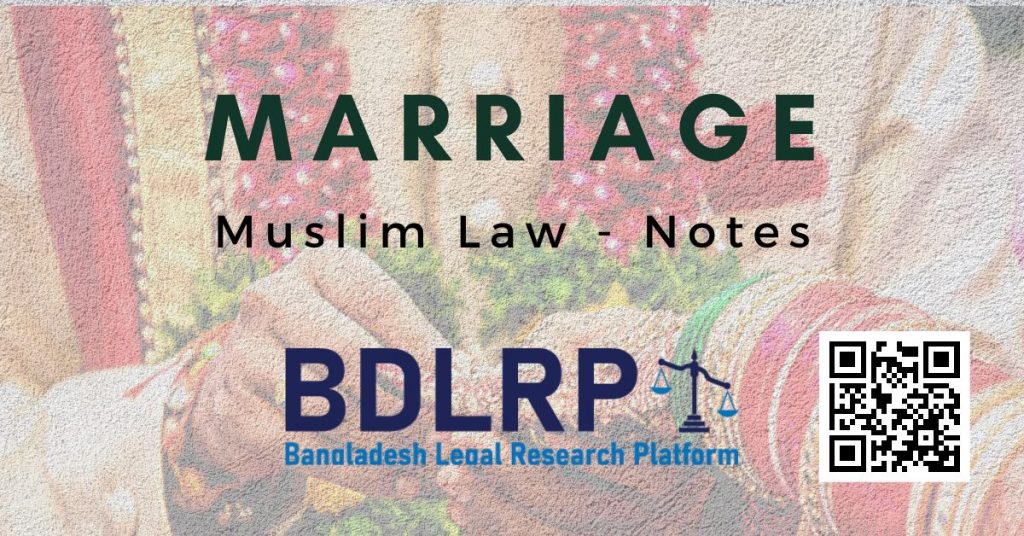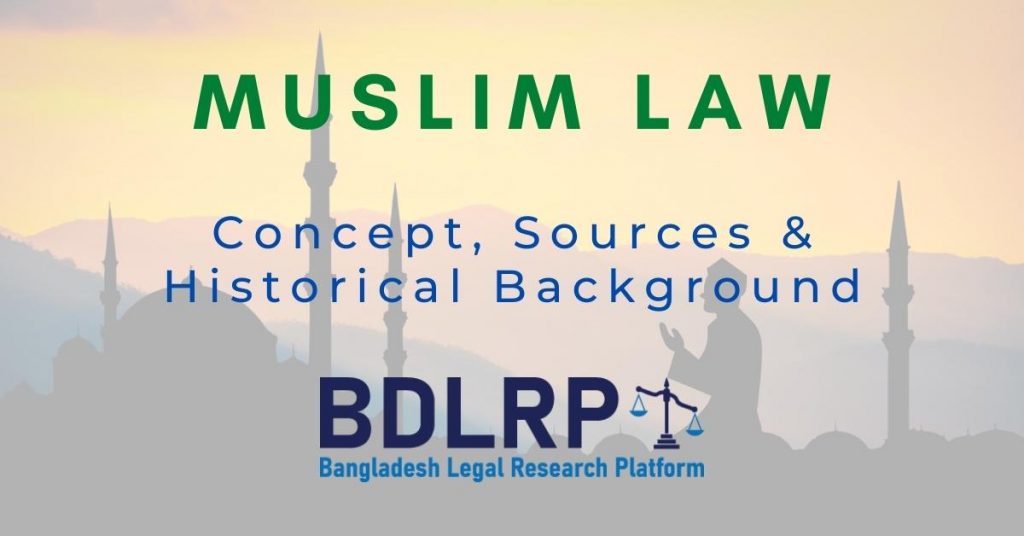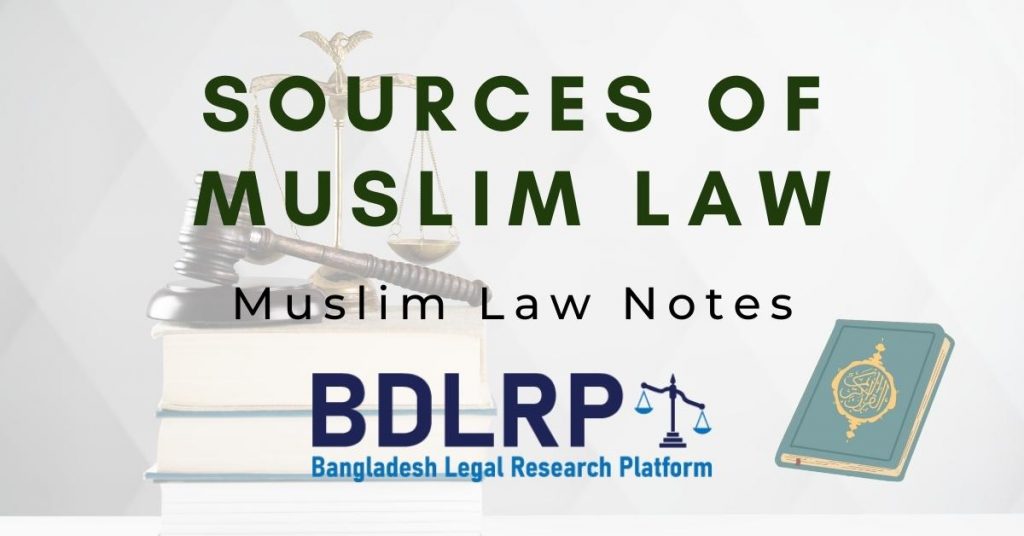Question- 01. Define the term “Gift”
The term “hiba” or “gift” has been differently defined by different jurists.
According to D.F. Mulla “gift is a transfer of property made immediately and without any exchange by one person to another person and accepted by or on behalf of the letter”
Ameer Ali cites from Durrul Mukhtar A hiba is defined as the transfer of the rights of property in the substance by one person another person without consideration (Iwaz)
Asaf Fyzee defines hiba is the immediate and unqualified transfer of the corpus of the property without any return.
According to Hedaya Gift in its literal sense signifies the donation of a things from which the donee may derive a benefit in the language of the law, it means the transfer of property made and without any exchange.
So, we can say that gift is thus the transfer of certain existing movable or immovable property made voluntarily and without consideration by one person called the donor to another person called the Donee and accepted by or on behalf of the Donee.
02. What are the essential elements of a valid gift?
It is essential that three conditions must be satisfied for the validity of a gift.
These are –
- A declaration by the donor with the intention to transfer in present to the Donee the subject matter of the gift.
They are shall be a Bonafede intention of the donor to make a gift.The declaration of intention is essential for the gift. A Muslim person who is of sound mind and has attained the age of majority may declare to make a hiba of his property. Is declaration in oral or written. The only condition is that the declaration must be made in clear words and it should not be ambitious.
- Acceptance of the gift expressed or implied by or on behalf of the Donee-
The donee must accept the gift for its validity, may be Expressly or impliedly. The acceptance of a gift must be by a person competent to accept. It is Donee who accepts the gift. Donee maybe any person only requirements is that he or she must be in existence at the time of declaration.Donee maybe Hindu, Christian or any non- Muslim or minor or insane person or a juristic person.
But if Donee is a minor or insane then the wali or guardians is entitled to take possession.
- Delivery of possession of the subject of gift by the donor to the Donee –
The donor should make delivery of the thing gifted to the Donee when he makes a declaration.
Such delivery of possession maybe actual or constructive.
Registration of a deed, of a gift without delivery or position is not enough. If the
Possession of property has not been delivered to the donee, the donor may revoke the gift before the actual delivery has been made.It is only with the transfer that gift become final.
03. When delivery of possession of the subject matter is not necessary to complete a gift?
Delivery of possession is not necessary in the following cases-
A) where the donor and Donee reside in the same house:
if the donor and the Donee reside in the same house, donor can complete the gift without physical transfer of possession. A Muslim lady who had brought up her nephew as her son, executed a deed of gift in favour of the nephew of a house in who is they were residing at the time of the gift.
The lady never departed from the Said house physically nor was the house formally handed over to the donee, but the property was transferred in his name. It was held that the gift was valid, although there was no physical delivery of possession.
B) where the gift is from the husband to the wife or vice versa:
Where a married couple live in a house belonging to the husband, the husband may make a valid gift to the wife, without physical delivery of possession. The same rule is applicable in the case of a wife making a gift to the husband.
It was held that as the donor and the Donee were husband and wife and so the husband continue to leave with his wife, donee,in that house which is was gifted. It was deemed that the husband would collect rents on behalf of the wife. It was held that the gift was valid.
C) where the father or the mother makes a gift to a child:
Transfer of possession is not necessary where a father or mother makes a gift of immovable property to their minor child.
The reason of that possession of the father is tantamount to the possession of the minor by virtue of the gift.
Similarly, where a gift is made to a minor by a person other than the father, the gift is rendered complete by the seized of the father of the minor.
The reason in favour of this principle is that it would be absured that the owner of the property hands over possession to himself as guardian as the child.
D) where the subject of the gift is in possession of the Donee at the time of the making of the gift under the following situation:
Where the subject of the gift is in position of the Donee at the time of making of the gift, the gift will be completed on declaration and acceptance without formal delivery of possession.
Thus, the gift of property in the possession of bailee, lessee or mortgagee is completely without formal transfer possession.
০4. Is a gift to a person not yet existence valid?
According to Islamic law a Donee must process some qualifications among these qualification, existence of Donee is one.
A) Donee must be in existence:
A gift can be made in favour of any person (natural or juristic) who is in existence and is capable of holding or owning property. Gift to a lunatic or minor is valid provided the possession of the gifted immovable property is transferred to their legal guardians.
B) gift in favour of an unborn person:
A unborn person means a person not existence and so is in capable to hold or own any property. A gift made in favour of an unborn person is invalid.
C) gift in favour of a child in the womb:
A gift to an unborn child may be made provided the child is born within 6 months from the date of the gift. Document is there this is the shortest period of gestation. But if a child is born after 6 months from the date of the gift, it is invalid as there is possibility that it was conceived after the gift of made.
05. Distinguish between gift and will.
Will and gift involve transfer of property by the testator and donor respectively and hence.
There are similarities between the gifts and will but there are also differences between the two from the point of view of law the difference are as follows:
(1) as regards the existence of the property:
In the case of gift, they are must be existence of property at the time of making gift, on the other hand Wasiyat (Will) it was not essential that there must be the existence of the property at the time of making Wasiyat. But it must be in existence at the time of the death of the testator.
(2) as regards the limit:
In case of gift there is no limit as to quantity of the property to be gifted. The donor May make gift of his entire property. But the law of ‘Will” restricted the right of the testator to one-third of his property. Will more than one third is invalid to that extend subject to certain exception.
(3) as regards transfer of possession:
They are must be transfer of possession at the time of making of the gift subject to a few exception. What in the case of will transfer of possession makes place only after the death of the testator.
(4.) As regards undivided property:
The doctrine of “Musha or undivided” property is applicable in the case of gift but not applicable in the case of “Will”
(5) as regards consent of their heir:
In the case of gift to heirs no consent of other heirs are necessary but in the similar case consent of other heirs are must for the validity of the will.
Again, in case of will more than one third, the consent of heirs are also necessary to make the will valid.
(6) as regards revocation:
A gift cannot be revoked after its completation. Will can be revoked before the date of the testator.
Author: Muhammad Towhid Iqbal, Department of law, University of Rajshahi

Author: Muhammad Towhid Iqbal
Department of law
University of Rajshahi





Comments are closed.